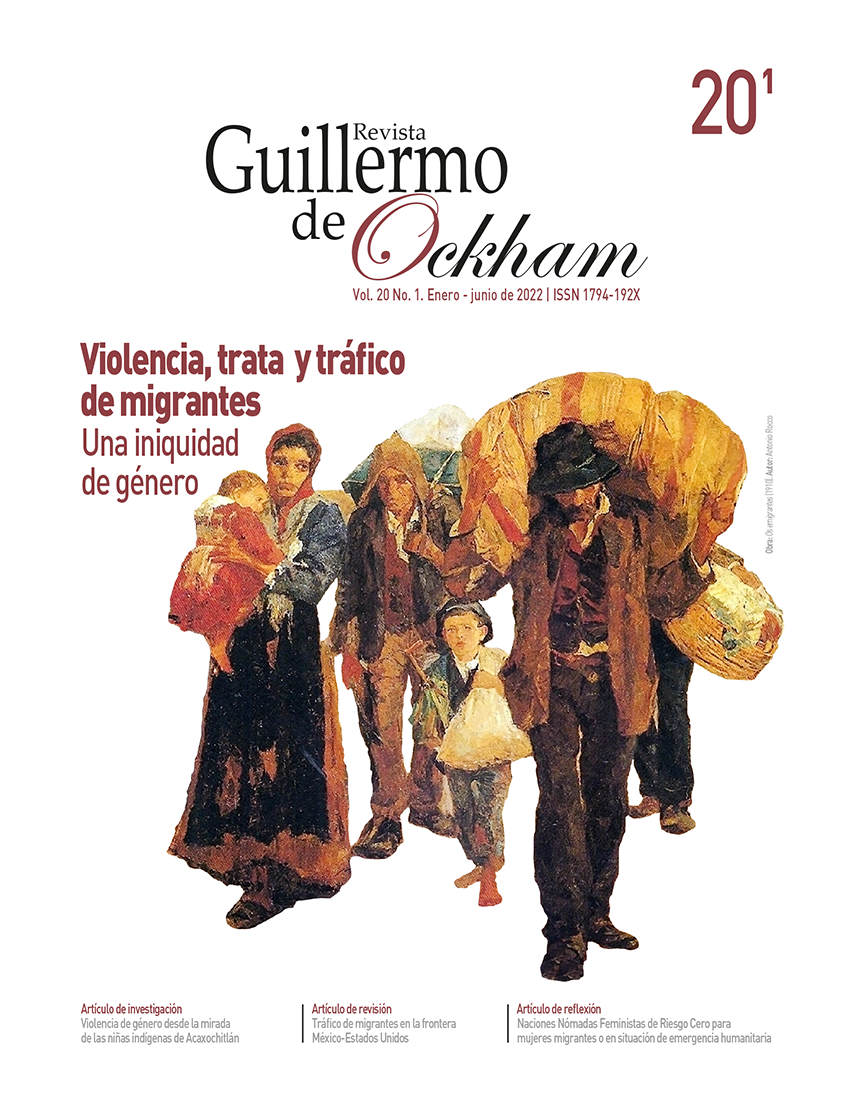The Revista Guillermo de Ockham provides an immediate and open access to its content, based on the principle of offering the public a free access to investigations to provide a global interchange of knowledge.
Unless otherwise established, the contents of this journal has a license with Creative Commons Attribution-NonCommercial-NoDerivatives 4.0 International (CC BY-NC-ND 4.0) http://creativecommons.org/licenses/by-nc-nd/4.0/
- Attribution: You must give appropriate credit, provide a link to the license, and indicate if changes were made. You may do so in any reasonable manner, but not in any way that suggests the licensor endorses you or your use.
- NonCommercial: You may not use the material for commercial purposes.
- NoDerivatives: If you remix, transform, or build upon the material, you may not distribute the modified material.
- No additional restrictions: You may not apply legal terms or technological measures that legally restrict others from doing anything the license permits.
Abstract
Gender studies have raised the need to discuss in depth the implications of prostitution form the perspective of women's human rights. The abolitionist theory is positioned from the defense of people's dignity and, without criminalizing those who find themselves in a situation of prostitution, makes it visible as a practice that should be eradicated, since it constitutes one of the most terrible strategies of exploitation and violence against women. The objective of this research was to comprehend the perceptions women have on the violence they experience in their bodies in the act of prostitution and the strategies that they implement to resist or establish limits in these unequal and violent erotic encounters. This qualitative research, with a descriptive scope, was supported by eleven interviews with women who are currently in a situation of prostitution, to which content analysis was applied. The results show that all of them have ended up in prostitution after having looked for other income options and they see it as a temporary situation from which they will leave to insert themselves in other work or study activities. As they do not perceive the violence that permeates the spaces their services are consumed in, their risk containment strategies are limited, and they assume mercantilist visions of their bodies without considering that there is an inequality of power in the interaction with male predators.
Keywords:
References
Callás, C. (2017). Sexo y dinero. Lectorum.
Castro, N., Escoto, A., Florez, N., Nava, I., Navarrete, E. L., Padrón, M., Román, P. & Sosa, M. (2021). México y su población ocupada al inicio de la pandemia por COVID-19: Entre la esencialidad y el riesgo de trabajo. Revista Latinoamericana de Población, Vol. 15, Nº 29, pp. 166-210.
Daich, D. (2012) ¿Abolicionismo o reglamentarismo? Aportes de la antropología feminista para el debate local sobre la prostitución. Runa, Vol. 33, Nº 1, pp. 71-84.
Diario Oficial de la Federación (8 de marzo de 2018). Ley General de Acceso de las Mujeres a una Vida Libre de Violencia.
Díez Gutiérrez, E. J. (2009). Prostitución y Violencia de Género. Nómadas. Critical Journal of Social and Juridical Sciences, Vol. 24, Nº 4.
Farley, M. (2003) Prostitution and the Invisibility of Harm. Women & Therapy, Vol. 26, No. 3/4, pp. 247-280. DOI: 10.1300/J015v26n03_06
Katz, I. M. (2013). ¿Qué tan liberal es usted? Coyoacán, México.
Lagarde, M. (2015). Los cautiverios de las mujeres: madresposas, monjas, putas, presas y locas. (2ª ed.). México, D.F.: Siglo XXI Editores.
Lagarde, M. y Valcárcel, A. (2011). Feminismo, género e igualdad. España: Pensamiento Iberoamericano.
MacKinnon, C. (2014). Feminismo inmodificado: Discursos sobre la vida y el derecho. Siglo XXI.
Monárrez, J. (2000). La cultura del feminicidio en ciudad Juárez, 1993-1999. Frontera norte, Vol. 12, No. 23, pp. 87-117.
Montiel, O. (2013). El lado obscuro del México profundo: La estructura básica de la explotación sexual y las lógicas de reproducción social comunitaria como parte del proceso de proxenitización en una región rural. México, D.F.: CIESAS.
Núñez, L. (2021). Prostitución y dictadura: Las retóricas del feminismo abolicionista de Buenos Aires. A&H, Revista de Artes, Humanidades y Ciencias Sociales, No. 14, pp. 191-219.
Organización de las Naciones Unidas para la Educación, la Ciencia y la Cultura [UNESCO], (19 de octubre de 2005). Declaración universal sobre Bioética y Derechos Humanos. http://portal.unesco. org/es/ev.php-URL_ID=31058&URL_DO=DO_TOPIC&URL_SECTION=201.html
Organización Panamericana de la salud [OPS] y Consejo de Organizaciones Internacionales de las Ciencias Médicas [OPS], (2017). Pautas éticas internacionales para la investigación relacio- nada con la salud con seres humanos. https://cioms.ch/wp-content/uploads/2017/12/CIOMS- EthicalGuideline_SP_INTERIOR-FINAL.pdf
Periódico Oficial del Estado “Plan de San Luis” (10 de octubre de 2017). Ley de Acceso de las Mujeres a una Vida Libre de Violencia del Estado de San Luis Potosí.
Prieto, Mariana, Rangel, Y., & Navarro, U. (2021). Controlar, proteger y defender el cuerpo, la gestión de una misma en la prostitución. La ventana. Revista de estudios de género, Vol. 6, No. 53. pp. 147-181.
Valdés, M. (2005). La feminización de la pobreza. Un problema global. Mujer salud/red de salud de las mujeres latinoamericanas y del caribe, pp. 72-80.

































